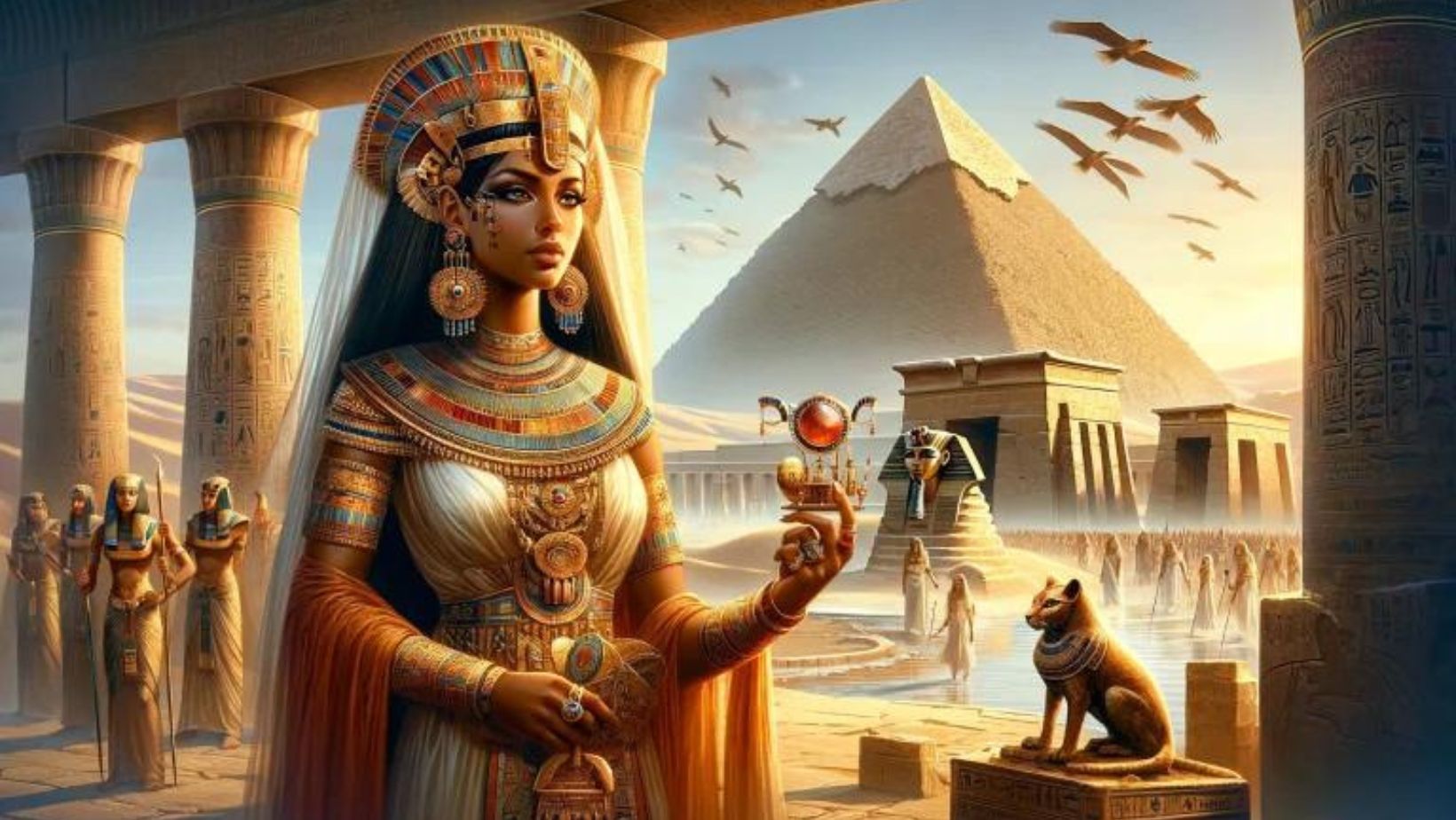Ever wondered how an ancient civilization like Egypt thrived under the rule of one of history’s most iconic figures? Well, you’re in luck because we’re about to explore just that. So, let’s chat about Cleopatra’s Economic Policies and how she had a real talent for guiding Egypt towards some pretty impressive economic growth. With strategic trade routes and savvy public relations, she turned the Nile valley not just into her domain but a center of wealth in the ancient world.
Table of Contents:
- Cleopatra’s Economic Strategies for Strengthening Egypt
- Cleopatra’s Relationships with Powerful Roman Leaders
- The Impact of Cleopatra’s Economic Policies on Egypt’s Prosperity
- Cleopatra’s Innovative Approach to Money and Finance
- Cleopatra’s Cultural and Intellectual Contributions to Egypt’s Economy
- Conclusion
Cleopatra’s Economic Strategies for Strengthening Egypt: Cleopatra’s Economic Policies

Cleopatra VII, the last active pharaoh of Ancient Egypt, is often remembered for her romantic entanglements with Julius Caesar and Mark Antony. But her reign was also marked by astute governance, including economic policies that played a crucial role in the prosperity of Egypt.
To understand Cleopatra’s economic policies, it’s essential to grasp the economic context of her reign. During the Ptolemaic period, Egypt was an economic powerhouse, primarily due to its agricultural abundance and strategic location. Cleopatra inherited a kingdom with a rich tradition of trade, a flourishing agricultural sector, and a well-established taxation system.
Managing the Egyptian Economy: Cleopatra’s Economic Policies
Cleopatra recognized the pivotal role of agriculture in Egypt’s economy and implemented policies to enhance agricultural output and promote sustainable farming practices. She invested in irrigation projects and encouraged the cultivation of new crops, diversifying Egypt’s agricultural landscape.
The queen also reformed the trade routes and fostered commercial relationships with neighboring regions. By nurturing a climate of commerce, Cleopatra contributed to Egypt’s wealth and economic stability.
Expanding Trade and Commerce
Cleopatra’s economic policies were instrumental in maintaining Egypt’s prosperity. The kingdom, strategically located at the crossroads of Africa and the Middle East, benefited from Cleopatra’s emphasis on trade.
She nurtured economic ties with neighboring regions, fostering a climate of commerce that contributed to Egypt’s wealth. The queen’s shrewd management of the kingdom’s resources allowed her to build a formidable naval fleet, expanding Egypt’s influence in the Mediterranean.
Investing in Infrastructure and Public Works
Cleopatra’s keen interest in maritime activities not only secured the country’s borders but also facilitated trade routes, contributing to the economic stability of her reign. She invested in constructing ports, lighthouses, and other infrastructure projects that bolstered Egypt’s trade capabilities.
The queen also undertook ambitious building projects, such as restoring temples and building new monuments. These public works showcased Egypt’s wealth and power and provided employment opportunities for the populace.
Cleopatra’s Relationships with Powerful Roman Leaders: Cleopatra’s Economic Policies
Cleopatra’s relationships with influential Roman figures, particularly Julius Caesar and Mark Antony, played a significant role in her political and economic strategies. These alliances not only helped secure her position on the throne but also had far-reaching implications for Egypt’s economy.
Partnership with Julius Caesar
Cleopatra’s alliance with Julius Caesar was a strategic move that helped her consolidate power and gain Roman support. By aligning herself with the powerful Roman general, Cleopatra secured military backing and political legitimacy.
This partnership also opened up new trade opportunities between Egypt and Rome, fostering economic growth and cultural exchange. Cleopatra’s savvy political maneuvering allowed her to navigate the complex power dynamics of the Roman Empire.
Alliance with Mark Antony: Cleopatra’s Economic Policies
Following Caesar’s assassination, Cleopatra formed an alliance with Mark Antony, another influential Roman leader. This partnership further strengthened Egypt’s ties with Rome and provided Cleopatra with the military support she needed to maintain her rule.
The alliance also had economic implications, as Antony granted Cleopatra control over valuable trade routes and territories in the eastern Mediterranean. This influx of wealth and resources bolstered Egypt’s economy and solidified Cleopatra’s position as a formidable ruler.
Leveraging Relationships for Political Gain
Cleopatra’s relationships with Caesar and Antony demonstrate her skill as a political strategist. She adeptly used these alliances to further her own political agenda and secure Egypt’s interests.
Cleopatra navigated the complex world of Roman politics by leveraging her charm and diplomatic skills, ensuring that Egypt remained a key player in the region. Her ability to forge alliances with powerful Roman leaders was a testament to her political acumen and understanding of power dynamics.
The Impact of Cleopatra’s Economic Policies on Egypt’s Prosperity
Cleopatra’s economic policies had a profound impact on Egypt’s prosperity during her reign and beyond. Her strategic decisions and innovative approaches to governance laid the foundation for a thriving economy that withstood the test of time.
Boosting Agricultural Production and Trade
Cleopatra’s focus on agriculture and trade had a significant positive impact on Egypt’s economy. By investing in irrigation projects and promoting sustainable farming practices, she increased agricultural output and ensured a stable food supply for the population.
Expanding trade routes and commercial relationships with neighboring regions also contributed to Egypt’s wealth. Cleopatra’s efforts to foster a commerce climate attracted foreign merchants and stimulated economic growth.
Stabilizing the Economy during Turbulent Times
Despite the political upheavals and power struggles that characterized her reign, Cleopatra managed to maintain a relatively stable economy. Her ability to finance wars and navigate complex power dynamics while still investing in infrastructure and public works is a testament to her economic acumen.
Even during times of economic hardship, Cleopatra implemented measures to mitigate the impact on the population. Her policies aimed at ensuring a consistent food supply and providing employment opportunities helped to stabilize the economy and prevent widespread unrest.
Leaving a Lasting Economic Legacy
The long-term impact of Cleopatra’s economic policies is evident in the historical record. Egypt thrived economically during her reign, experiencing a period of relative stability and prosperity.
Even after her demise, the queen’s foresight in implementing comprehensive economic reforms laid the groundwork for sustained growth. Modern historians, with a more nuanced perspective, have started to reevaluate Cleopatra’s contributions, shedding light on her effective economic policies.
Click here to watch the video
Key Takeaway: Cleopatra’s Economic Policies
Cleopatra wasn’t just a drama queen; she was a mastermind in boosting Egypt’s economy. She turbocharged agriculture, opened up trade routes, and built key infrastructure. Her alliances with Rome’s big shots also brought wealth and stability to Egypt.
Cleopatra’s Innovative Approach to Money and Finance

Cleopatra was a savvy economic strategist who understood the importance of a stable currency and sound financial management. She inherited a kingdom with a rich tradition of trade, a flourishing agricultural sector, and a well-established taxation system.
But Cleopatra didn’t just maintain the status quo. She introduced innovative reforms that transformed Egypt’s monetary system and financial landscape.
Introducing New Coinage and Currency Reforms
One of the smartest moves Cleopatra made for Egypt’s economy was giving its coin system a complete makeover. She introduced new denominations minted from precious metals like silver and gold, facilitating large transactions and international trade.
Coins stamped with Cleopatra’s face were all the rage, showcasing her mighty influence and putting Egypt’s riches on full display. But she didn’t stop there.
Managing Debts and Financial Obligations
Cleopatra was also adept at managing Egypt’s debts and financial obligations. She sat down with creditors from far-off lands, including some savvy Roman financiers, to discuss the debt terms and negotiate a better deal.
This financial finesse allowed Egypt to maintain its independence and avoid becoming a mere vassal state of Rome. Cleopatra’s shrewd debt management kept Egypt’s economy afloat during tumultuous times.
Adapting to Changing Economic Conditions
Cleopatra’s reign was marked by political upheaval and shifting alliances. But through it all, she adapted her economic policies to changing circumstances.
When droughts or other natural disasters threatened Egypt’s agricultural output, Cleopatra adjusted tax collection and implemented relief measures. She led with her sleeves rolled up, always ready to adapt and see ahead when economic storms hit.
Cleopatra’s Cultural and Intellectual Contributions to Egypt’s Economy
Cleopatra’s influence extended beyond the realm of pure economics. She patronized the arts and sciences, and her cultural initiatives had far-reaching effects on Egypt’s economy and society.
Cleopatra understood that a thriving cultural scene could attract trade, stimulate innovation, and elevate Egypt’s international prestige. And she put that understanding into practice.
Patronage of the Arts and Sciences: Cleopatra’s Economic Policies
Cleopatra was a big fan of the arts and all things brainy, supporting a bunch of creative and smart projects. She commissioned grand construction projects, from temples to libraries, which employed countless artisans and craftsmen.
Her court was a haven for scholars, philosophers, and scientists from across the Hellenistic world. By investing in the arts and sciences, Cleopatra created a vibrant cultural economy that drove innovation and attracted the brightest minds of the age.
Blending Greek and Egyptian Cultures
Cleopatra was a master of cultural fusion. She wholeheartedly celebrated her Greek roots while also showing deep respect for Egyptian traditions and spiritual beliefs.
This blending of cultures was more than just a political strategy. It created a vibrant scene where people could easily swap goods, share knowledge, and inspire each other creatively. While Cleopatra was in charge, Alexandria turned into a buzzing center of art and business that caught the attention of the whole world.
Leaving a Lasting Cultural Legacy
Cleopatra’s cultural patronage left an indelible mark on Egypt’s artistic and intellectual landscape. Even long after she had stopped ruling, her impact lingered, molding the very essence of Egypt and how it connected with the rest of the globe.
Today, Cleopatra remains an icon of Egyptian culture, a testament to the enduring power of her cultural legacy. Her patronage of the arts and sciences wasn’t just a side note to her economic policies – it was a central pillar of her vision for a prosperous and influential Egypt.
Key Takeaway: Cleopatra’s Economic Policies
Cleopatra wasn’t just a ruler; she was a savvy economic and cultural powerhouse. She revamped Egypt’s currency, managed debts cleverly, and adapted to crises smartly. Beyond economics, her support for arts and science fueled innovation and made Egypt a global culture hub.
Conclusion: Cleopatra’s Economic Policies
As we’ve traveled through time, it’s been amazing to watch how the right economic strategies can completely change a country’s game. From bolstering agricultural production to fostering trade across continents, it was all part of a day’s work for Cleopatra. Her efforts ensured that even amidst political upheavals and wars with Rome, Egypt remained not only stable but prosperous.
Diving into history isn’t merely flipping through old pages; it’s unearthing timeless nuggets of wisdom on leading effectively and strategizing that still hit home today. Just as AI subtly aids our daily lives without heralding doom or gloom predicted by movies, similarly, Cleopatra’s economic policies quietly laid down tracks for future generations to marvel at – proving once again that true innovation stands the test of time.

